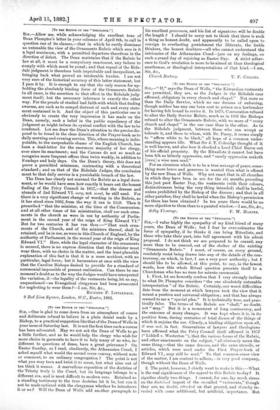I To THE EDITOR OF THE " SPECTATOR "] SIR,— "
If," says the Dean of Wells," the Edwardian vestments are permitted, they are, as the Judges in the Ridsdale case affirmed, obligatory in every church and chapel." Not more so than the Daily Service, which no one dreams of enforcing, though neither has any one been sent to prison as a lawbreaker for having felt bound to revive it. In 1879, Convocation refused to alter the Daily Service Rubric, much as in 1661 the Bishops refused to alter the Ornaments Rubric, with no more of " every church and chapel" in the one case than in the other. As to the Ridsdale judgment, between those who can accept or tolerate it, and those to whom, with Dr. Pusey, it seems simply to "affirm white to be black," all hope of a common under- standing appears idle. What Sir J. T. Coleridge thought of it is well known, and also how it shocked a Lord Chief Baron out of his official propriety. By the Ritualists it cannot but have been felt as bitterly oppressive, and "surely oppression maketh [even] a wise man mad."
For an eirenicon which is to be a true message of peace, some- thing more brave and generous is wanted than what is offered by the new Dean of Wells. Why not enact that in all churches in which they have been in use for the six mouths preceding this just past Easter Day, the vestments (with their colours, distinctiveness being the very thing intended) shall be lawful, unless prohi,bited by the Bishop of the diocese ; and that in all other parishes, they shall be lawful when the Bishop's permission for them has been obtained ? In ten years there would be no more objection to them than to a painted window.—I am, Sir, &c.,


































 Previous page
Previous page